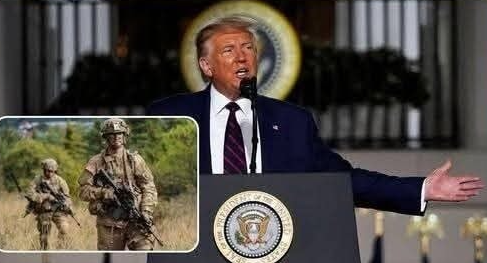WHOA: ‘Mystery Man’ Who Donated $130 Million to Pay US Troops During ‘Schumer Shutdown’ IDed
We are now 25 days into what has been widely dubbed the “Schumer Shutdown” — a government standoff triggered by Democrats who, according to critics, are holding federal operations hostage over an extensive list of progressive policy demands. Many observers believe that Democrats assumed Republicans would acquiesce to their priorities without pushing back, but the political stalemate has persisted, leaving thousands of essential workers in limbo.
On Thursday, the gridlock became painfully apparent. Lawmakers rejected a bill that would have temporarily ensured pay for essential federal employees, many of whom serve on the frontlines of government operations. The move drew widespread criticism for its perceived disregard for ordinary Americans who rely on timely paychecks to meet their daily needs. For those affected — from TSA officers to military personnel — the shutdown has been far from a theoretical inconvenience; it has real financial consequences.
However, a surprising twist emerged by Friday. President Trump announced that an anonymous donor had stepped forward with an extraordinary contribution: $130 million intended to help pay the troops during the ongoing shutdown. This act of generosity brought a glimmer of hope for service members who, through no fault of their own, were caught in the political crossfire.
The following day, The New York Times revealed the identity of this mysterious benefactor: Timothy Mellon, the reclusive billionaire heir to the Mellon banking fortune. Mellon has long been known in financial circles for his immense wealth — Forbes estimates it at $14.1 billion — and his philanthropic endeavors, but he largely avoids media attention, preferring to remain out of the public eye.
It’s worth noting that, as of now, neither Mellon nor President Trump has formally confirmed the report. Nevertheless, the credibility of the story is bolstered by Mellon’s history of large, sometimes headline-grabbing contributions. For example, in 2024, following Trump’s conviction on 34 counts of falsifying business records as part of New York Attorney General Letitia James’ legal actions, Mellon donated a staggering $50 million to a Trump-aligned PAC — a move that drew national attention and reinforced his reputation as a quietly influential donor.
Despite his vast wealth and high-profile donations, Mellon remains something of a “Mystery Man” to the public: a private individual with eclectic interests and unconventional ventures. A member of the Pittsburgh-based Mellon banking family, he has previously been a significant donor to independent political candidates, including Robert F. Kennedy Jr., highlighting his willingness to support causes outside traditional party lines. The BBC has reportedly reached out to Mellon for comment regarding his political contributions, though he has yet to respond publicly.
Mellon’s personal life adds to his enigmatic reputation. Unlike many U.S. billionaires who embrace visibility and celebrity, he prefers a quiet existence in Wyoming, far removed from the social and media circles that define the lives of most of his peers. Yet his passions are far from ordinary. A dedicated aviator, Mellon once funded a private expedition to investigate the mysterious disappearance of Amelia Earhart, the legendary pilot who vanished over the Pacific in 1937. In 1998, he acquired the brand, name, and logo of the defunct Pan Am airline, intending to leverage it for his railroad ventures — a testament to his flair for ambitious, unconventional projects. Pan Am Railways was later sold to CSX Corporation in 2022, but the acquisition demonstrated Mellon’s willingness to invest in ventures that blend historical legacy with modern business innovation.
While Mellon’s donation is undeniably generous, it raises complex questions about how, or even whether, the funds can be used amid the ongoing shutdown. The Pentagon has reportedly accepted the donation on behalf of the U.S. military, but legal restrictions — namely the Antideficiency Act — prevent federal agencies from spending money that has not been appropriated by Congress during a shutdown. Pentagon spokesman Sean Parnell clarified that the donation came with the specific condition that it be applied to offset the cost of service members’ salaries and benefits.
For troops who are currently enduring the consequences of a prolonged shutdown, the situation underscores the absurdity of the political stalemate. Men and women in uniform, who dedicate their lives to protecting the nation, should not have to worry about whether political negotiations will impact their paychecks. Mellon’s donation, while generous, highlights a gap in the system: when political impasses stall government operations, private intervention can temporarily alleviate the burden, but it cannot replace the legislative process or ensure long-term stability.
As the shutdown continues, the administration faces the challenge of finding a legal and effective way to utilize Mellon’s donation, ensuring that the intended beneficiaries — the U.S. military personnel — receive the support they urgently need. If successful, the initiative could serve as a rare instance of bipartisan recognition of the importance of timely military compensation.
For the troops on the ground, the hope is simple: that no matter what political wrangling occurs in Washington, their dedication, sacrifices, and service are respected and protected. Mellon’s unexpected generosity offers a rare moment of relief in a difficult period, serving as a reminder that even in times of political turmoil, acts of humanity and civic responsibility can make a tangible difference.
